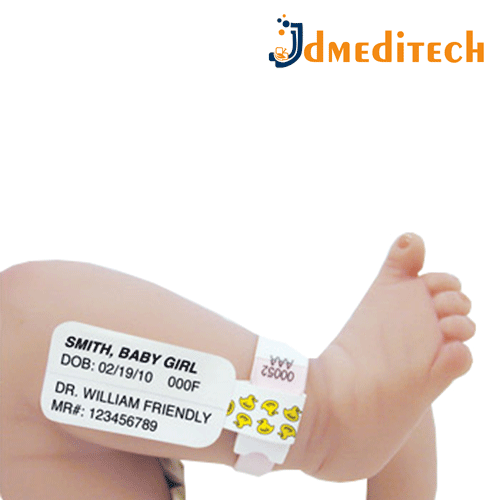How to Ensure the Safety and Accuracy of Patient Information with a Patient Identification Band
How to Ensure the Safety and Accuracy of Patient Information with a Patient Identification Band
Blog Article
Just How Patient Identification Band Plays an Essential Function in Patient Monitoring and Care
Patient Identification bands work as an important cog in the detailed machinery of health care systems, working as a secure against medical mistakes. As the frontline tool for verifying Patient identification, these bands underpin crucial procedures from administering the correct medication to making sure the best individual undergoes the assigned procedure. The profound effect of such a seemingly basic tool on Patient safety and security, experience and end results could shock lots of, leaving one to contemplate the prospective innovations and innovations that might better improve their effectiveness.

Comprehending the Essentials of Patient Identification Bands
In spite of the simplicity of their appearance, Patient Identification bands serve a crucial duty in healthcare setups. These easy wristbands, often made of plastic or paper, hold a riches of details critical for Patient management and care. They commonly display the Patient's complete name, day of birth, and an unique Identification number, acting as the main source of Patient Identification. The bands might additionally present information such as allergic reactions or unique treatment guidelines, giving medical care specialists with prompt accessibility to crucial info. Using these Identification bands is thought about an universal protocol in health care, focused on making certain Patient safety and security and precision of treatment delivery. However, the effectiveness of Patient Identification bands depends heavily on consistent usage and accurate information input.
The Function of Patient Identification Bands in Minimizing Clinical Mistakes
A shocking variety of medical mistakes occur because of Patient misidentification, highlighting the indispensable duty of Patient Identification bands. These simple, yet critical, tools, aid doctor in correctly recognizing people, therefore minimizing the probability of errors. These bands, typically geared up with barcodes or QR codes, consist of crucial Patient details such as name, age, and medical history. This ensures that the appropriate care is supplied to the ideal Patient at the best time. In high-stress settings where clinical employees juggle numerous obligations, Patient Identification bands act as a fast and reputable reference. Significantly, they offer a safeguard versus misidentification, lowering the danger of incorrect diagnoses, medicine mistakes, and unnecessary procedures, consequently playing an important function in decreasing clinical errors.
Enhancing Patient Safety And Security With Identification Bands

The Influence of Patient Identification Bands on Patient Experience
Nearly all clients in health care settings experience the you could check here use of Identification bands throughout their treatment journey. These bands, normally used around the wrist, have an extensive influence on the Patient experience. They offer as a constant, visible pointer of the Patient's identification and medical problems, guaranteeing people that they are acknowledged and taken care of. This simple yet essential tool can significantly lower stress and anxiety, specifically in large medical facilities where the Patient may communicate with various healthcare carriers. Additionally, these bands facilitate smooth shifts in between different care areas, guaranteeing smooth continuity of treatment. Periodic inaccuracies or pain associated with bands can negatively affect Patient complete satisfaction. Healthcare companies must ensure precision and convenience in making use of Identification bands.
Future Advancements and Developments in Patient Identification Bands Innovation
While present Patient Identification bands have confirmed reliable in improving treatment, the perspective of technological advancements assures even higher renovations. Arising innovations, such as radio-frequency Identification (RFID) and Quick Feedback (QR) codes, provide a brand-new level of accuracy and efficiency. RFID tags can provide real-time Patient location tracking, while QR codes can save thorough Patient details available through mobile visit this web-site phone scanning. Moreover, integration of fabricated intelligence can enable computerized Patient information analysis, forecasting prospective health and wellness dangers and enhancing treatment strategies. Biocompatible materials are likewise being checked out to boost Patient convenience. These developments not only boost Patient security but also improve healthcare procedures. Hence, future technologies in Patient Identification bands hold considerable potential in revolutionizing Patient treatment.
Final thought
Patient Identification bands are a crucial go to these guys possession in health care, ensuring precise Patient Identification and reducing clinical mistakes. These devices enhance Patient security, boost self-confidence in healthcare systems, and boost Patient experiences and end results. With the potential for future improvements in Identification band innovation, their role in Patient monitoring and treatment is established to come to be much more crucial, enhancing their relevance in the distribution of efficient and safe health care.
Exactly How Patient Identification Band Plays an Important Duty in Patient Management and Care
A staggering number of medical errors happen due to Patient misidentification, underscoring the indispensable role of Patient Identification bands. patient identification band.Undoubtedly, the use of Patient Identification bands significantly boosts Patient safety and security in medical care setups. Thus, future technologies in Patient Identification bands hold significant capacity in reinventing Patient treatment
Patient Identification bands are an indispensable asset in healthcare, making sure exact Patient Identification and reducing medical mistakes.
Report this page